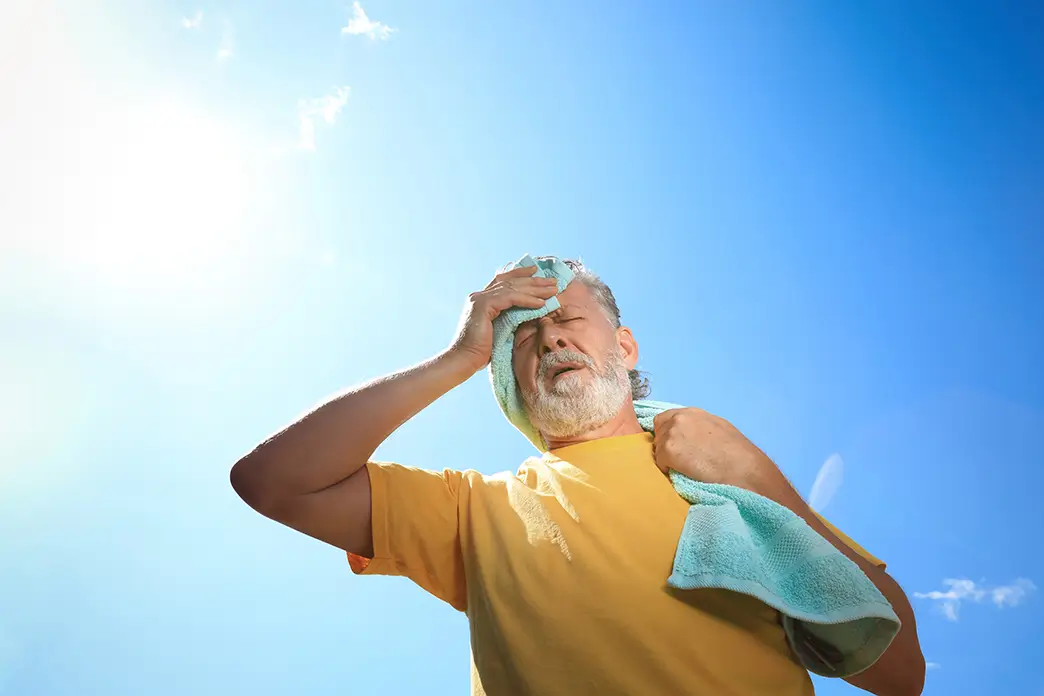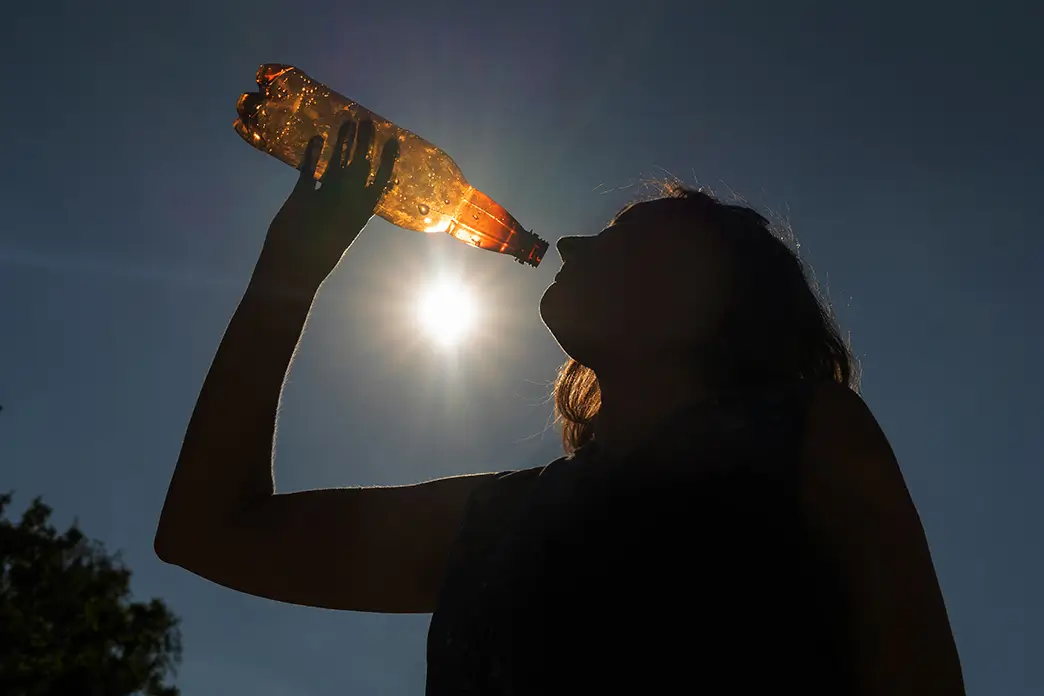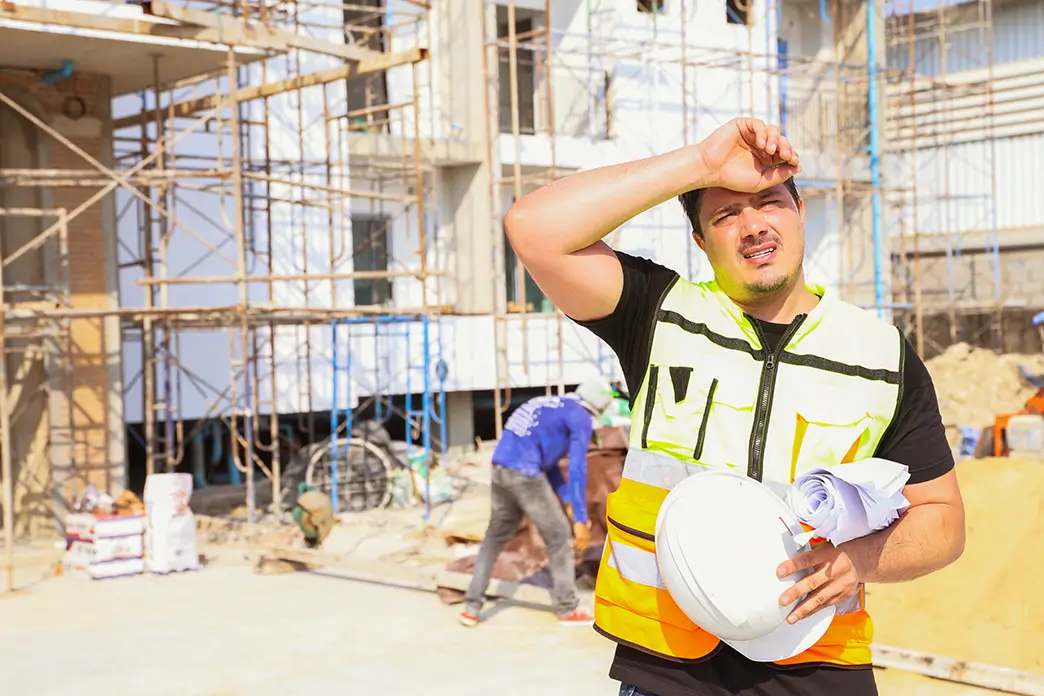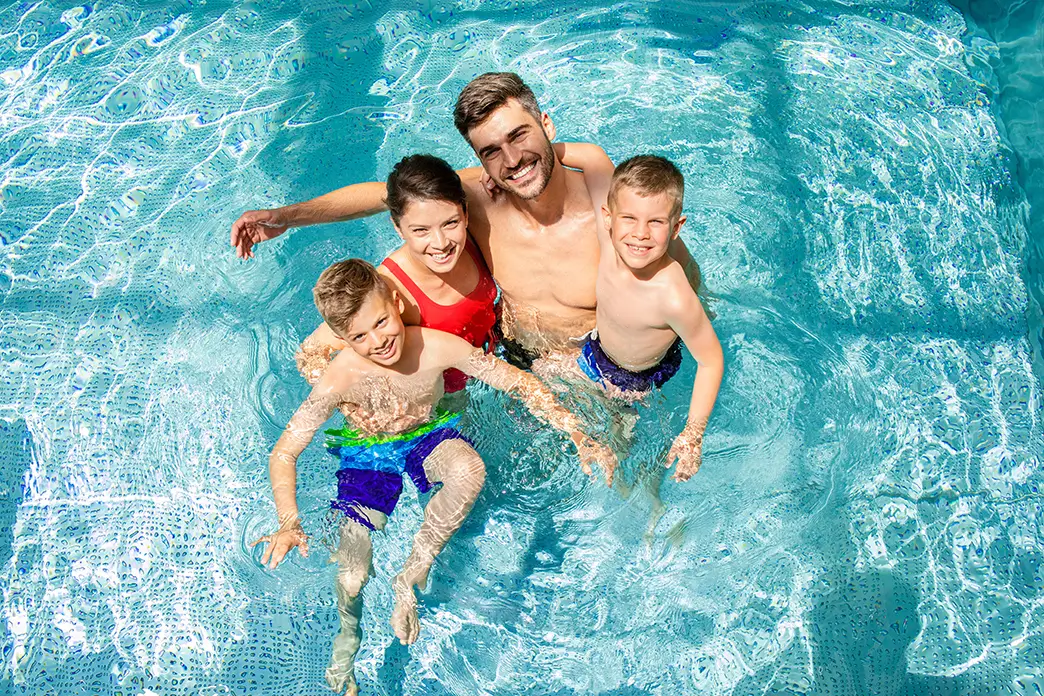
Warning: Overheating – Dangers of Summer Heat
Most people love summer, but when the summer heat becomes too intense, serious health risks from overheating can arise. Elderly people, young children, and individuals with weak circulatory systems or very low blood pressure are particularly at risk. To avoid spoiling your enjoyment of the warm season, it’s essential to take appropriate precautions. Additionally, it's important to recognize the signs of overheating in time—both in yourself and others. Often, it's a gradual process that can be halted without consequence if interrupted early enough.
Contents
Contents
Summer is the season for outdoor activities – whether at the beach, in the city, or in the countryside. To ensure that your enjoyment of this beautiful time of year is not spoiled by overheating, we have gathered important information on heat-related complaints and protective measures against summer heat in this post. You can reach the desired topic by clicking on the corresponding item in the table of contents.

How does the body react to heat and overheating?
Up to a certain point, summer warmth is beneficial for our well-being. Our core body temperature is around 37 degrees Celsius. The warmer the air around us, the fewer calories the body needs to burn to maintain this temperature. In a warm environment, the body can relax. However, the core body temperature must remain as constant as possible. If the ambient temperature is so high that the body can't release enough heat, the organism begins to overheat. Even an increase in body temperature of more than 0.5 degrees can lead to health complications if it persists for a long time. At 42 degrees, it becomes life-threatening. This is why high fever is also dangerous. The human body has various mechanisms to prevent overheating.
The skin is our largest organ and our protective barrier against various threats. It is also our heat shield and plays a crucial role in temperature regulation. As soon as it gets hot, blood vessels dilate, and blood circulation shifts more to the skin. This allows the body to release heat more quickly. However, this also lowers blood pressure and increases the strain on the heart and circulatory system, as they have to work harder. Physical performance significantly decreases. People with already low blood pressure often feel very weak and exhausted on hot days.
The second important bodily reaction to reduce temperature is sweating. The skin is equipped with countless sweat glands that secrete the watery fluid as soon as core body temperature rises. Sweat evaporates on the skin's surface, providing effective cooling. However, sweating also has a downside: the body loses a lot of water and excretes electrolytes such as sodium, potassium, or magnesium, which are necessary for important bodily functions. Therefore, it is important to drink enough to replenish the lost water. In Germany, tap water is usually safe to drink without concern—it is strictly tested for cleanliness and also contains numerous electrolytes.
Physical activity also generates heat and triggers sweating. Anyone working in a hot environment or exercising on hot days must be especially careful not to overheat. Humidity plays a crucial role, as sweat cannot evaporate if the surrounding air is already too moist. The air simply doesn't absorb any more water. Nonetheless, sweating continues—there is a risk of overheating while simultaneously drying out. This is also why 30 degrees in the shade with dry air doesn’t feel as hot as 30 degrees with high humidity. Dry heat is easier to tolerate—yet it is still important to replenish lost water.

Overheating – Common Complaints Due to Summer Heat
When the body's cooling mechanisms are not sufficient to balance the ambient temperature, the body continues to heat up. The strain on the heart and circulatory system as well as the loss of water and electrolytes also affects other organs. The kidneys, which regulate water and electrolyte balance, are directly impacted. Our brain also depends on an uninterrupted supply of fluids and nutrients to function. Therefore, overheating can quickly affect the state of consciousness. Sometimes, this leads to the affected individuals not realizing that they are overheating and thus requiring external help.
First responders, in turn, should be able to recognize the symptoms of overheating and distinguish them from other emergencies. Extreme heat can trigger various symptoms – overheating is signaled by specific symptoms. Those who recognize these can intervene in time before the body's core temperature reaches a critical level. Below are some typical complaints and dangers caused by (summer) heat:
- Dehydration: If the body is not supplied with enough fluids, it begins to dehydrate. Dehydration can occur at any temperature, but the so-called exsiccation occurs particularly quickly when the body sweats a lot. An adult needs at least two liters of water per day – even double the amount in heat or during physical exertion. If the body lacks water, it manifests in dry mucous membranes, a "sticky" tongue, and a strong feeling of thirst. Headaches and fatigue also occur and intensify. As dehydration progresses, consciousness becomes clouded, and cramps can occur. In addition to adequate fluid intake, eating water-rich foods also helps to stay hydrated on hot days.
- Exhaustion: Extreme heat challenges the body – the widening of blood vessels and the loss of fluids through sweating cause blood pressure to drop. Every effort becomes difficult, and affected individuals feel thirsty, often have a high pulse, and breathe rapidly but weakly. Nausea and dizziness are also common. It's essential to get out of the sun and find a cool, shaded place. Drinking and cooling down are now necessary. If the weakness persists for an extended period, medical assistance should be sought. Heat exhaustion is a first warning sign that the body is overheating.
- Cramps: The muscles require the electrolytes lost through sweat to function. The muscles react to overheating and fluid loss with so-called heat cramps. The cramps occur primarily in the legs or arms during exertion. Again, it's advisable to avoid any exertion immediately and find a cool place to rest. Cold sprays or cool packs can cool the cramping muscle from the outside and provide relief. However, it's more important to avoid further exertion and drink plenty of fluids.
- Heat Collapse: If blood pressure drops too much due to heat, it leads to heat collapse. The brain and other vital organs are compromised due to inadequate blood supply and the loss of electrolytes through sweating. A strong feeling of weakness, nausea, headaches, and dizziness signal an impending collapse. If a feeling of extreme heat and red skin suddenly gives way to paleness and cold sweat, unconsciousness is imminent. Emergency services should be contacted immediately! First responders should take the affected individuals to a cool, shaded place and have them lie down with their legs elevated. In older or weakened individuals and small children, a collapse can occur much faster than in healthy young or middle-aged adults. The body temperature in heat collapse usually remains below 40 degrees Celsius.
- Heat Stroke: When the body's core temperature rapidly rises above 40 degrees, heat stroke is imminent. The brain begins to swell due to the heat buildup – a life-threatening situation! Heat stroke often affects older people who have stayed too long in the sun without protection. When younger individuals suffer heat stroke, they have usually exerted themselves physically in the heat beforehand. Heat stroke can develop slowly, but if fluid loss, body temperature, and circulatory weakness build up long enough, it can become critical within minutes. An unclear state of consciousness, up to unconsciousness, along with noticeably hot, reddened skin, are typical symptoms. Call 112 and provide cooling. Warning: Do not give ice-cold water or immerse the affected person in cold water to avoid further temperature shock.
- Sunstroke: Sunstroke is similar to heat stroke but develops over a longer period. It is an irritation of the meninges that can lead to life-threatening cerebral edema. Sunstroke is also signaled by headaches, severe cramps, and nausea. Move to the shade, cool down, and drink plenty of water. A bright red face, vomiting, and altered consciousness are typical symptoms of acute sunstroke – medical help should be sought immediately.
- Heat Rash: When sweat cannot evaporate due to high humidity or sweat-soaked clothing remains on the skin for an extended period, an itchy rash often develops. Heat rash is caused by clogged sweat pores and usually disappears soon after the skin is washed and stops sweating heavily.
- Heat Edema: As a side effect of extreme heat, some people develop fluid retention in their lymphatic vessels, leading to visible swelling, mainly around the ankles. People with sensitive lymphatic systems are mostly affected, and heat edema often occurs only at the beginning of the hot season and disappears on its own over time.

How to Stay Cool and Healthy in Summer Heat
If possible, you should **avoid being outside in the sun during the hottest hours of the day**. On very hot days, it is advisable to use the early morning or evening for errands, walks, or sports. Above all, you should avoid physical exertion under direct sunlight. In addition to the heat, humidity should also be considered: On sultry days, it is harder for the body to cool down through sweating.
When you are outside, **loose, airy clothing** is recommended. This allows for better ventilation compared to tight clothing. Natural fibers such as cotton or linen are preferable to synthetic fabrics, as they let more air through and better absorb sweat. Head coverings like **straw hats and other summer hats** are very useful as they keep the scalp pleasantly cool. Protecting your head from the sun is one of the most important measures against overheating. Children playing in the sun should also wear caps or sun hats. Be mindful of potential symptoms in children during heat, as they often forget they are thirsty or overheated in the excitement of play.
**Where you are** also makes a big difference. Densely built, concrete, and glassy inner cities without much greenery turn into ovens in summer. Plants allow absorbed water to evaporate, cooling their immediate surroundings. A walk in the forest is preferable to a stroll through the city center in summer heat. It is always slightly cooler near water – swimming pools, lakes, or beaches also offer the opportunity to cool down directly in the water. However, avoid jumping into cold water when overheated – the resulting cold shock can overload the heart.
In buildings, much depends on the insulation of the house and the location of the rooms. Especially older attic apartments or highly glazed apartments can heat up significantly. Ventilate early in the morning and evening and keep the windows closed when it is hottest. Curtains and blinds can block a lot of heat. If you have an apartment that still heats up, it may sometimes be better to ensure constant cross-ventilation and keep the air moving with fans. Cooling sprays, wet calf wraps, or cool foot baths can make the heat more bearable – a lot of heat can be dissipated through the feet.
Also, consider that every electrical device, from light bulbs to televisions, produces heat. Turn off everything that is not absolutely necessary. Sleep in the coolest room you have. If the humidity is not too high, you can cool your bedroom by draping a damp sheet over a clothes rack. This creates **evaporative cooling**, making the room climate more pleasant. If you have an air conditioner, you should manage without the above measures. However, make sure not to set the air conditioner too cold so that the heat does not overwhelm you when you leave the house.
Drink enough to ensure that your body has sufficient fluids and electrolytes available to replace what is lost through sweating. Avoid cold drinks, even if they promise to cool you down. The body processes lukewarm liquids better when it is hot. Light, water-rich foods like watermelon or cucumbers also help maintain fluid balance. Digesting heavy foods strains the body more. Try to avoid alcohol on hot days.

Heat Hazards of Parked Cars
Parked cars heat up significantly within a short time if they are in the sun. Even outdoor temperatures just above 20 degrees, which are not yet perceived as hot, are enough. Nevertheless, the sun can cause the temperature inside a parked vehicle to rise to sauna-like temperatures in just a few minutes. The hotter the sun shines, the faster and more intensely the car heats up – an open window crack does not change this. Therefore, never leave children, weakened individuals, or pets in a parked car! Passersby are allowed to break the car windows in an emergency to rescue the occupants from heatstroke.
If you find yourself in such a situation, contact the police and emergency services as soon as possible and speak to other passersby. Witnesses can confirm that a real emergency existed. In the case of an unresponsive or non-reactive person in the overheated car, quick and independent action may be necessary. For animals, the situation is stricter, and witnesses should confirm the emergency to avoid being charged with property damage. If possible, wait for emergency services to arrive.
Avoid getting into an overheated car directly. First, open the doors for a few minutes to let the heat escape. Even seat cushions or the steering wheel can become painfully hot. Seat covers or a damp towel for wiping can help here. Ideally, park in the shade.



